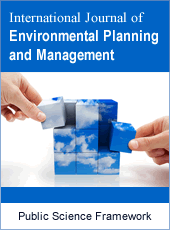International Journal of Environmental Planning and Management
Articles Information
International Journal of Environmental Planning and Management, Vol.6, No.2, Jun. 2020, Pub. Date: Jun. 10, 2020
Impact of Flood on Wetland Ecosystem Services in Rwanda
Pages: 40-46 Views: 1797 Downloads: 676
[01]
Marie Claudine Ingabire, Faculty of Environmental Studies, University of Lay Adventists of Kigali, Kigali, Rwanda.
[02]
Evase Ntaganira, Faculty of Environmental Studies, University of Lay Adventists of Kigali, Kigali, Rwanda.
[03]
Virginie Mugorereyimana, Faculty of Environmental Studies, University of Lay Adventists of Kigali, Kigali, Rwanda.
[04]
Jean Paul Muzezayo, Faculty of Environmental Studies, University of Lay Adventists of Kigali, Kigali, Rwanda.
[05]
Lamek Nahayo, Faculty of Environmental Studies, University of Lay Adventists of Kigali, Kigali, Rwanda.
[06]
Theogene Ngaboyamahina, Rwanda Environment Management Authority, Kigali, Rwanda.
This study assessed the impacts of flood on urban wetland ecosystem with emphasis on Nyabugogo wetland. The study was a descriptive with a quantitative and qualitative survey approach. Purposive sampling methods identified 100 respondents from Gatsata, Gisozi, Muhima and Kimisagara sectors of Kigali city which surround the wetland. The structured questionnaire was used to collect data which were analyzed by using Microsoft Excel. The results indicated that the majority of respondents consider wetland as the main source of provisioning services, subsistence and commercial crops, and livestock feed and fresh water. Respondents also agreed on the fact that regulating and support services are important services provided by the wetland. However, it was noticed that flood occurrence declines ecosystem services at the Nyabugogo wetland. Lack of protecting the wetland’s surrounding mountains from runoff and poor drainage systems were mentioned as key drivers to flood by 42% and 30% of respondents, respectively. Therefore, appropriate wetland protection measures are required to perform their functions and provide goods and services to sustain human life. This would lead to sustainable development and green growth resulting from the existing and delivery of ecosystem services.
Community, Ecosystem Services, Flood, Nyabugogo Wetland, Kigali
[01]
Bouwer, L. M., Crompton, R. P., Faust, E., Hoppe, P., and Pielke, R. A.: Disaster management. Confronting disaster losses, Science, 318, 753.
[02]
Prenger-Berninghoff et al., 2014). Jonkman, S. N. (2005). Global perspectives on loss of human life caused by floods. Natural Hazard, 34 (2), pp 151–175.
[03]
Brody, S. D., Zahran, S., Highfield, W. E., Grover, H. & Vedlitz, A. 2008. Identifying the impact of the built environment on flood damage in Texas. Disasters, 32, 1-18.
[04]
Rufat, S., E. Tate, C. G. Burton, and A. S. Maroof. 2015. Social vulnerability to floods: Review of case studies and implications for measurement. International journal of disaster risk reduction 14: 470-486.
[05]
Balica, S., I. Popescu, L. Beevers, and N. G. Wright. 2013. Parametric and physically based modelling techniques for flood risk and vulnerability assessment: a comparison. Environmental modelling & software 41: 84-92.
[06]
Liao, J., Y. Jia, L. Tang, Q. Huang, Y. Wang, N. Huang, and L. Hua. 2018. Assessment of urbanization-induced ecological risks in an area with significant ecosystem services based on land use/cover change scenarios. International Journal of Sustainable Development & World Ecology 25 (5): 448-457.
[07]
W., and Ward, P. J.: Declining vulnerability to river floods and the global benefits of adaptation, P. Natl. Acad. Sci. USA, 112, E2271–E2280.
[08]
MIDIMAR. 2014. National Contingency for Flood and Landslides, Ministry of Disaster Management and Refugee Affairs, (MIDIMAR), Kigali-Rwanda. 47.
[09]
Nikuze, A., R. Sliuzas, J. Flacke, and M. van Maarseveen. 2019. Livelihood impacts of displacement and resettlement on informal households-A case study from Kigali, Rwanda. Habitat international 86: 38-47.
[10]
Habonimana, H. V., Bizimana J., Tuyishimire, J., Uwayezu E., &Mugisha J. (2014). Integrated flood modelling for flood hazard assessment in Kigali City, Rwanda. Research Gate, pp 2-5.
[11]
Bizimana, J. P., and M. Schilling. 2009. Geo-Information Technology for Infrastructural Flood Risk Analysis in Unplanned Settlements: a case study of informal settlement flood risk in the Nyabugogo flood plain, Kigali City, Rwanda. In Geospatial techniques in urban hazard and disaster analysis: Springer, 99-124.
[12]
Nhapi, I (2011). Assessment of water pollution levels in the Nyabugogo catchment. The open Environmental Engineering journal.
[13]
Adelekan, I. O. 2011. Vulnerability assessment of an urban flood in Nigeria: Abeokuta flood 2007. Natural hazards 56 (1): 215-231.
[14]
Douglas, I., Alam, K., Maghenda, M., Mcdonnell, Y., McLean., & Campbell, J.(2008) Unjust waters: climate change, flooding and the urban poor in Africa. Sage journals 20 (1).
[15]
Dandapat, K., and G. K. Panda. 2017. Flood vulnerability analysis and risk assessment using analytical hierarchy process. Modeling Earth Systems and Environment 3 (4): 1627-1646.
[16]
Renaud, F. G., K. Sudmeier-Rieux, and M. Estrella. 2013. The role of ecosystems in disaster risk reduction: United Nations University Press.
[17]
Sandholz, S., W. Lange, and U. Nehren. 2018. Governing green change: Ecosystem-based measures for reducing landslide risk in Rio de Janeiro. International journal of disaster risk reduction.
[18]
Liu, Y., K. Yin, L. Chen, W. Wang, and Y. Liu. 2016. A community-based disaster risk reduction system in Wanzhou, China. International journal of disaster risk reduction 19: 3.

ISSN Print: 2381-7240
ISSN Online: 2381-7259
Current Issue:
Vol. 7, Issue 4, December Submit a Manuscript Join Editorial Board Join Reviewer Team
ISSN Online: 2381-7259
Current Issue:
Vol. 7, Issue 4, December Submit a Manuscript Join Editorial Board Join Reviewer Team
| About This Journal |
| All Issues |
| Open Access |
| Indexing |
| Payment Information |
| Author Guidelines |
| Review Process |
| Publication Ethics |
| Editorial Board |
| Peer Reviewers |


